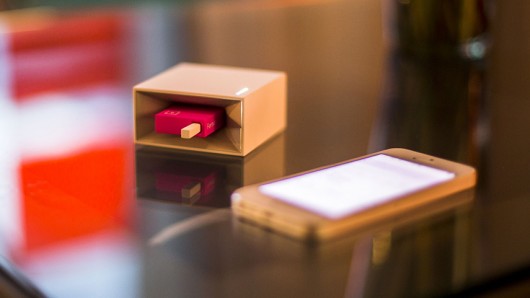
Cue examines a droplet of saliva or blood to calculate a digital measurement of your health
Not so long ago, self health monitoring was largely limited to weighing ourselves to see how a diet was going and sticking a thermometer under our tongue to see if we were getting sick. For everything else we went to the family doctor. That was in the past. Technology has put health and fitness monitoring firmly in consumers’ hands. Starting with pedometers in the 1980s and progressing to the myriad wearable fitness trackers flooding the market today. The grip has just tightened again with Cue – a device that allows users to run medical diagnostics from the comfort of their own home.
Testing for five key health indicators; inflammation, vitamin D, fertility, influenza, and testosterone, Cue is claimed to be the most advanced consumer health product available to date. While these seem to be an interesting bundle of self-tests to release a product with, developers identified them as the most common tests run by general practitioners (GPs) in the US and say more tests will be rolled out in the future.
Tests are undertaken at home by taking a small sample and loading it into a testing cartridge, which is in-turn loaded into the Cue sensor unit. Sample types vary depending on the test being undertaken, with influenza requiring a nasal swab, testosterone a saliva sample and blood for the rest. These samples are placed on a wand that is loaded into a cartridge engineered with the chemistry and microfluidic design needed to prepare the sample for Cue to test. The wand remains locked in the single use cartridge for disposal. with the Cue’s composite microfluidic system and biosensors converting the biological sample into digital information.
This information is transmitted to a companion app for iOS and Android devices via Bluetooth 4.0, with the app then offering ideas on how to improve health. These come in the form of diet plans and suggested activities like going to the gym, running and walking. Suggested activities can be tailored to the user's interests and can be combined with activity data from existing wearable devices.
"We created Cue as a tool for people who are interested in connecting with their health in a much more direct, intuitive, and powerful way than ever before," says Ayub Khattak, Cue founder and CEO. "People can now keep daily track of measurements that used to be available only on a yearly or bi-yearly basis. We brought together the best minds and spent over four years creating the most advanced consumer health product we have ever seen."
Two interesting functions are the fertility indicator and the flu map for influenza alerts. The fertility indicator gives women looking to conceive a "try now" alert based on the measurement of Luteinizing Hormone, which is produced by the pituitary gland and regulates fertility. Meanwhile, the flu map tracks the spread of influenza in your local area but seems to be reliant on the widespread take-up of Cue to be effective. That aside, it is an interesting concept of cloud health monitoring.
"We worked to make sure that Cue delivered meaningful Information in a way that can be understood without a medical degree," says Clint Sever, Cue founder and Chief Product Officer. "The result of this approach is a product that opens up an entirely new world of possibilities for understanding and improving our health."
While the creators of Cue are adamant they are not trying to replace the need for doctors, the DIY testing unit certainly empowers the user and frees us from the queues of the infected and sickly often encountered at the average GP. And while visiting a doctor regularly can be time consuming and rather expensive, the convenience of Cue does come with a price tag of US$20 for five cartridges. If used on a daily or even weekly basis would quickly add up. The influenza tests are slightly more expensive at three for $30, but wouldn’t be needed as regularly.
The Cue unit is available for preorder at $149, with shipping set for the (Northern Hemisphere) Spring of 2015. The full commercial release will follow shortly after at an expected retail price of around $300.
The Cue promotional video can be viewed below.
Source: Cue
All content copyright © Gizmag 2003 - 2014